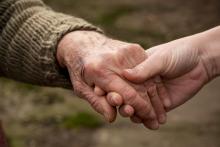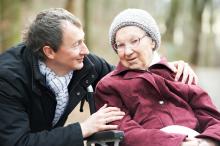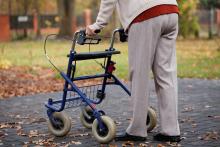American Rescue Plan Act: Extra Funding for Home and Community-Based Services
Wisconsin’s commitment to home and community-based services (HCBS) received a boost, thanks to the American Rescue Plan Act (ARPA). An estimated $350 million in federal funding has helped state residents who are elderly or disabled receive much-needed services to allow them to live as independently as possible. This funding supports improvements to Wisconsin’s HCBS programs that are unique to the needs and priorities of our residents. HCBS programs that received funding include:
- Children’s Long-Term Support (CLTS)
- Family Care
- Family Care Partnership
- IRIS (Include, Respect, I Self-Direct)
- Program for All-Inclusive Care for the Elderly (PACE)
DHS used the funding to improve Wisconsin Medicaid services in areas like personal care, private duty nursing, home health, and habilitative services.
Highlights
New Division of Quality Assurance (DQA) Provider Portal
DHS DQA has launched a new online licensure and certification system for Health and Residential Care Providers. This system is fully automated and will eliminate paper applications, reduces manual data entry, and improves workload management.
Wisconsin HCBS Innovation Grants Summit
DHS held a working conference where attendees came together to share the lessons learned from the grant experience, took home practical and actionable ideas, and together shaped the future of HCBS in Wisconsin.
Home and Community Based Service (HCBS) minimum fee schedule
DHS launched a new HCBS minimum fee schedule, which defines the lowest rates managed care organizations (MCOs) can pay providers of certain adult long-term care services.
American Rescue Plan Act HCBS funding details
ARPA was signed into law on March 11, 2021. The act provided a total of $1.9 trillion in economic stimulus to aid the recovery from the COVID-19 pandemic. Of the $350 billion earmarked for state, local, Tribal, and territorial governments, Wisconsin received $2.5 billion.
Section 9817 of ARPA also gave qualifying states a temporary 10% increase to their federal matching percentage on specific home and community-based services from April 1, 2021, through March 31, 2022. The Wisconsin Department of Health Services (DHS) used ARPA funds to strengthen our HCBS programs, address direct care workforce issues, and develop strategies to delay the need for long-term care. The Centers for Medicare & Medicaid Services granted conditional approval of the plan, allowing Wisconsin to start claiming the increase. We had until March 31, 2025, to invest the approximately $350 million in funding.
State initiatives
These strategic initiatives led by DHS and funded by ARPA represent much-needed investments to help our most vulnerable state citizens live their best lives.
Medicaid HCBS Rate Reform
Wisconsinites with disabilities and who are older rely on HCBS to meet their daily needs. HCBS are a cost-effective alternative to higher-cost institutional services, such as nursing home care or hospital services. Demand for HCBS is growing, and the state needs higher HCBS rates to recruit and retain direct care workers.
- DHS launched a new HCBS minimum fee schedule on October 1, 2024, which defines the lowest rates managed care organizations (MCOs) can pay providers of certain adult long-term care services.
- DHS rolled out a 5% rate increase for HCBS on January 1, 2022. It applies to multiple service providers who work with Medicaid programs.
Direct Care Workforce Reform and Analysis
Wisconsin’s direct caregiving workforce is the backbone of HCBS. To better recruit, support, and retain these vital workers, we used ARPA funds to:
- Conduct workforce surveys to assess turnover, tenure, wages, benefits, and other factors.
- Implement a tiered-rate career ladder for personal care and supportive home care workers that rewards professional advancement.
- Expand career opportunities through a statewide professional credentialing and continuing education program. Learn more at WisCaregiverCDCP.com.
- Design a statewide registry of direct care workers. This included credentialing details plus specialty education and expertise. Qualified providers can register for this free platform, WisCaregiver Connections.
Medicaid HCBS Innovation Grants
This grants initiative created opportunities to strengthen HCBS programs. Currently, over 100,000 children and adults receive HCBS services in Wisconsin. The grants provided new resources to some of the most pressing issues faced by this population. Grants assisted providers with COVID-19 recovery and improving, enhancing, and expanding their services.
Tribal Long-Term Care Enhancements
This DHS initiative aimed to support Tribal communities through a comprehensive approach. This included funding for home improvements to ensure safety and independence, expanded access to medical equipment, and enhanced community-based services. With a focus on respecting Tribal sovereignty and addressing the unique needs of Tribal elders and individuals requiring care, the program successfully secured additional funding to meet rising demands, illustrating a significant investment in the health and well-being of Tribal members.
Social Connection Grants
DHS launched two grant programs to help fight loneliness and make communities more livable for older adults and people with disabilities.
- Social isolation and loneliness grants were awarded to various public and private organizations to create new ways to help people feel more connected and less isolated. These efforts improved services at home and in the community so that older adults don't have to move into long-term care facilities too soon.
- Livable communities grants were awarded to support solutions for people to connect, get around, or stay engaged with greater ease, which can reduce the risk of serious health issues. The goal was to make places where older people live better so they can stay independent and involved in their communities longer, avoiding the need for expensive care or moving away from home.
Independent Living Supports Pilot
Many Wisconsin residents who don't require long-term care services or are not currently eligible for Medicaid could benefit from short-term, flexible support to stay independent and healthy. For example, home modifications or small amounts of supportive home care or respite care would allow more people to remain in their own homes. This would help ease the increased burden on Wisconsin’s long-term care system as our population ages.
DHS collaborated with partners to implement a pilot program. The pilot offered short-term, flexible, and limited services and support for people at risk of entering Medicaid long-term care. This pilot program provided invaluable insight into how people seek information about services and support. It also helped us understand potential barriers to accessing those services.
Homeless and Housing Services for People with Disabilities
There are more than 4,500 people experiencing homelessness in Wisconsin, according to a study published by the National Alliance to End Homelessness. This DHS initiative assisted individuals with disabilities who are homeless or who may need mental health services.
Two Wisconsin Independent Living Centers (ICLs) were awarded this grant: Midstate Independent Living Choices and Independent Living Resources. These ICLs:
- Used outreach staff to connect people with disabilities to temporary housing, public benefits, counseling, mental health treatment, and other resources to help them live independently rather than being homeless or institutionalized.
- Followed the peer support model. Outreach staff are peer specialists who can help expose the people receiving services to recovery resources and skills training.
- Increased the staffing hours of the Mental Health Drop-in Center from 30 hours to 40 hours a week and helped support staff travel to meet people face-to-face for mental health services in underserved geographic regions.
This grant program was a vehicle to address racial and health equity disparities for people with disabilities. ICLs awarded reached approximately 200 individuals by June 2025.
Aging and Disability Resource Center Modernization
Aging and Disability Resource Centers (ADRCs) serve older adults, adults with disabilities, as well as caregivers and professionals in the community. An ADRC provides unbiased information on a broad range of programs and services, helps people understand the various long-term care options available to them, helps people apply for programs and benefits, and serves as the access point for publicly-funded long-term care. To further support their work, DHS:
- Developed a searchable website where customers can review resources in their community and obtain a point of contact for their local ADRC. This online resource network provided an additional, accessible way to review services provided in local, in-person offices throughout the state.
- Invested in ADRC outreach and education to connect those in need with information about how an ADRC can help.
- Improved public access to information and resources about publicly funded long-term care programs and other options to remain independent at home.
- Provided modernized technology to ADRCs and aging programs to support their work in serving customers.
Wisconsin Wayfinder (No Wrong Door)
Families of children with delays, disabilities, special health care needs, or mental health conditions should be able to find programs and services easily, no matter which county they live in or where they go for help. The “no wrong door” approach means that no matter where or how a family reaches out, they will be able to connect to the resources they need to thrive. Launched in the fall of 2023, Wisconsin Wayfinder supports families at that crucial time following a child’s initial diagnosis, when a specific need is first identified, and throughout the years as the child grows and their needs change.
Assisted Living Reporting, Assessment, and Certification
As our state’s aging population grows, DHS is working to make it easier to collect data from assisted living settings and ensure that data remains secure. We created:
- An Adult Family Home (AFH) Provider Portal. This online portal helps 1-2 bed adult family home providers for the IRIS (Include, Respect, I Self-Direct) program become certified. The AFH Provider Portal allows providers the ability to create their own accounts, upload documentation, and view certification status. This portal also allows managed care organizations (MCOs) to submit information to DHS on the 1-2 bed adult family homes certified for Family Care and Family Care Partnership programs.
- An HCBS Provider Portal. This secure, online portal helps nonresidential settings (adult day services, prevocational, group supported employment, and children's day services) become compliant with the HCBS Settings Rule. The HCBS Provider Portal allows providers the ability to create their own accounts, upload documentation, and view compliance status.
- A secure, online system to collect data from licensed and certified assisted living providers. Facility and resident assessment information can be entered to provide information to the Bureau of Assisted Living and help the facilities by providing a framework of areas to be assessed per state licensing/certification regulations and access to review their collected data.
Division of Quality Assurance Licensing, Certification, and Renewal
The Division of Quality Assurance (DQA) is responsible for licensing and certifying health and community care provider services in Wisconsin. As the number of applications to license and certify providers and programs continues to grow, DQA implemented a new system for licensure/certification, background checks, plan reviews, and other provider applications. The DHS DQA Provider Portal allows applicants to:
- Submit applications
- Complete required background checks
- Pay required fees
- Submit building/life safety code applications for construction/remodeling of health care facilities plan review
The system is fully automated to allow DQA to process all applications within the system, provide applicants the ability to check the status of their application, and return any revisions directly in the system. This system eliminates paper applications, reduces manual data entry, and improves workload management to issue licenses and certifications to providers and programs.
Adult Incident Reporting System
Ensuring the health and safety of people using HCBS is critical. As of December 2023, DHS has developed and implemented a new online system for managed care organizations to report critical incidents to DHS. This new system allows for real-time reporting with improved requirements to assist in tracking and trending data statewide. Using this new data will help DHS identify ways to make needed improvements to increase our member’s health and safety.












